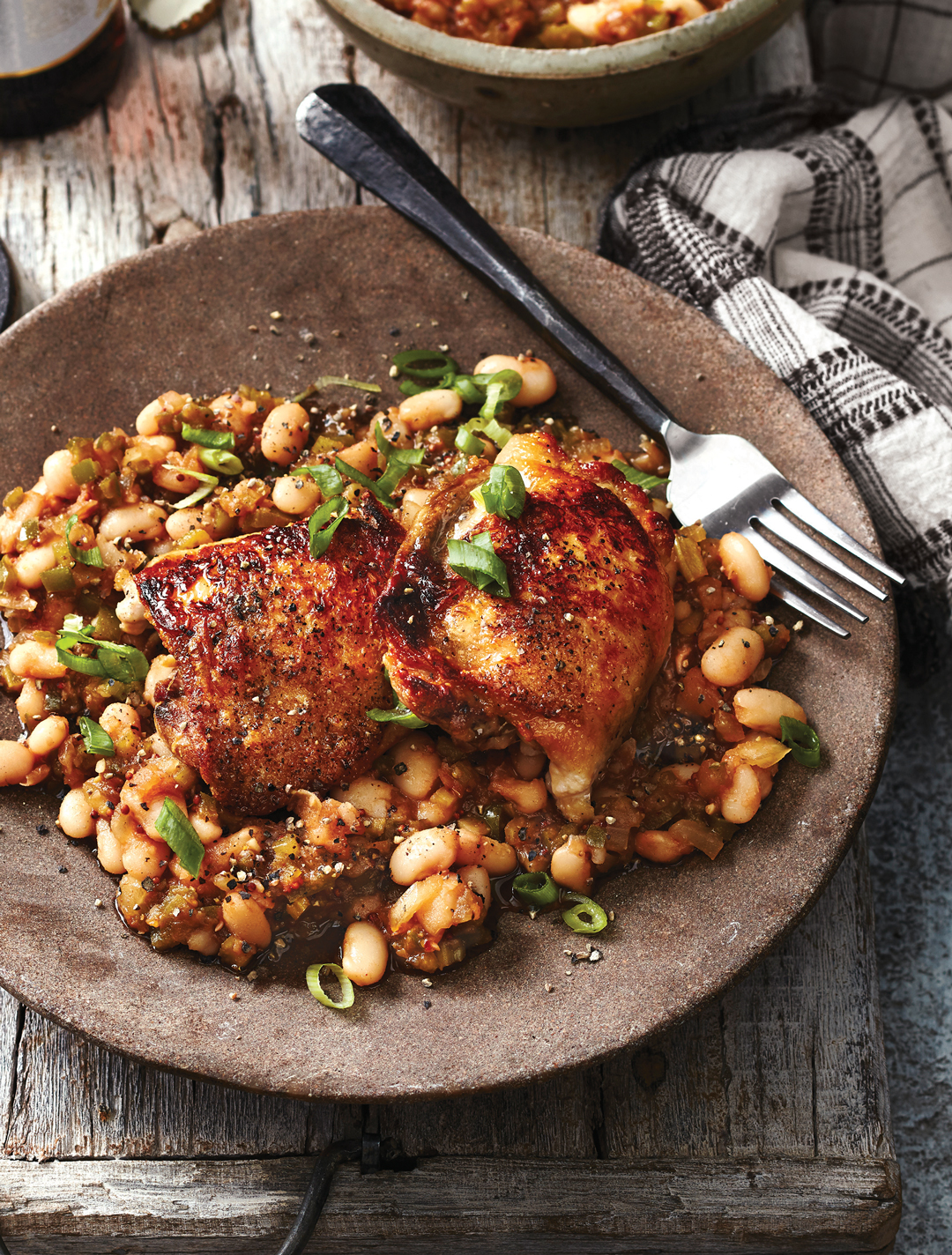
Photograph by John E. McDonald
One day late last year, an advance copy of Todd Richards’s cookbook arrived in the mail at the chef’s home. When he saw it for the first time—from the dewy collard greens on the cover to his mother’s fried catfish recipe inside—he knew his family’s legacy had been sealed.
The origins of Soul: A Chef’s Culinary Evolution in 150 Recipes date back to Richards’s upbringing on the south side of Chicago. As he writes in Soul, the type of food his parents and grandmother cooked—collards and chicken gizzards and cornbread—was as segregated as the city itself, absent from “the menus of fine dining restaurants or fancy hotels.” The dishes on his family’s dinner table “were considered low-quality and not deserving of the price.”
Richards first came to Atlanta in 1992. He was just 20, chasing a career in the music business. What he found instead was a job in a Kroger meat department. From there, he got a line cook gig at the Blue Ribbon Grill across the street. Its chef later recommended him to Darryl Evans, executive chef of the Four Seasons Hotel in Atlanta. Evans not only taught Richards techniques such as frenching the bones of a rack of lamb (“It gave me insight that people eat with their eyes first,” Richards says) but also inspired him to apply those techniques to the food he grew up with—the food that defined him.

Photograph courtesy of Time Inc. Books
“My first job in fine dining was with a world-renowned, African American chef leading a predominantly black staff,” Richards says of Evans. “He showed me that cooking was not just a job but a serious art form. Seeing him wearing the chef whites, having polished shoes, and maintaining a super-clean kitchen was a strong image.”
The image stayed with Richards during stints at restaurants in West Palm Beach and Louisville. And it stayed with him after his eventual return to Atlanta, where he became executive chef of The Ritz-Carlton Buckhead, The Shed at Glenwood, The Pig & The Pearl, and White Oak Kitchen; went on to open Richards’ Fried Chicken in Krog Street Market and be named culinary director of Jackmont Hospitality (heading up One Flew South and Chicken + Beer); and earned two James Beard Award nominations.
Richards considered Evans’s views while determining how he could offset the challenges that black chefs face. “Chef Evans didn’t speak much about race,” Richards recalls. “He wanted us to rise above it. If your food is great and they still want to talk about your race, that’s their problem.”
But Richards came to realize that phenomenal food alone did not guarantee a chef’s success. He found that one of the biggest obstacles for ambitious black chefs is the lack of economic resources for opening their own restaurants. “Chefs end up bankrolling a startup restaurant with their house as collateral and their own money. If your family doesn’t have those resources, your opportunities are limited,” Richards says. “We as an African American community need to work more closely together.”
Richards’s restaurants have served as both inspiration and incubator to up-and-coming chefs; Christian Perez, whose City Pharmacy in Covington recently opened to considerable buzz, counts Richards as a mentor, as does the team that launched Ludacris’s Chicken + Beer. But Richards wanted to do more to preach the gospel of soul food. Empowering young chefs is one part of the solution. Enlightening the public on soul food more broadly is another. That’s what led to his cookbook.
“Chefs distance themselves from soul food due to economics; they can’t make that much money from the cuisine because it is undervalued,” Richards says. “Soul food needs to move forward in a way that raises its economic value. Black chefs will then be free to cook whatever they want, including our traditional food.”
Richards sees Soul as a transformative text—a path to wider acceptance and appreciation for African heritage cuisines in the United States. The book is organized into chapters based on humble ingredients, including collards, onions, corn, tomatoes, and beans and rice. Soul reframes soul food by highlighting the versatility of each ingredient, particularly its uses in global cuisines. Collard greens become the foundation for a ramen dish or for pesto. A crispy version of pork chitlins, which are typically stewed, shows up alongside stir-fried rice. The flavors of West Africa, Europe, Asia, and the Americas meld together for a 21st century Sunday supper or an elegant dinner party.
“Soul food is an unlimited form of cooking that makes the best of what you have available,” Richards says. “It’s the freest form because it has no boundaries.”
Adrian Miller is a James Beard Award–winning author based in Denver, is a food writer, attorney, and certified barbecue judge who lives in Denver. Currently the executive director of the Colorado Council of Churches, Miller previously served as a special assistant to President Bill Clinton and a senior policy analyst for Colorado governor Bill Ritter Jr. Miller’s first book, Soul Food: The Surprising Story of an American Cuisine, One Plate at a Time, won a James Beard Foundation Award. His second book, The President’s Kitchen Cabinet: The Story of the African Americans Who Have Fed Our First Families, From the Washingtons to the Obamas, has been nominated for a 2018 NAACP Image Award.
This article appears in our April 2018 issue.













